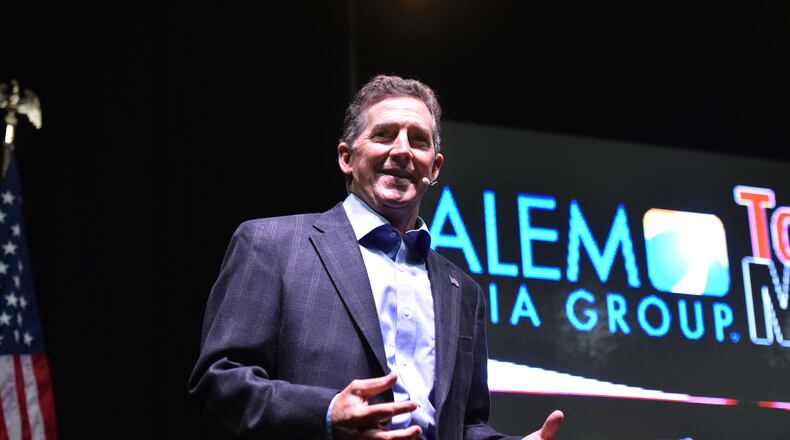Welcome back to the party of Lincoln.
If there was a surprisingly consistent theme to the RedState Gathering in Atlanta — where some 800 conservative activists heard from nine presidential candidates earlier this month — it was the broadening of the Republican message to include more Americans. The idea wasn’t to stray from conservative principles, or to talk differently to different groups, but to talk about conservatism as improving all Americans’ lives.
So Washington doesn’t need, and Republicans shouldn’t offer, a different program for every sub-group of Americans, said former Sen. Jim DeMint. “If you tell Americans you’re giving them opportunity for all but favoritism for none,” he told the crowd, “most of them will take that deal.”
In an interview afterward, DeMint, who now heads the powerhouse Heritage Foundation, said conservatives have long trailed the left at communicating a broad message. But he argued they’re making strides from “trying to explain policies, rather than helping people see this is really going to make their lives better.
“That’s what we’re in this for,” DeMint continued. “And we can prove that what this president’s done, and what liberal-leftist policies have done around the world, don’t make people’s lives better, they don’t help the poor.”
The new messaging wasn’t always evident in the GOP's first primary debate (hello, Donald Trump) but it did show up.
It was in Ohio Gov. John Kasich’s observation that “America’s a miracle country, and we have to restore the sense that miracle can apply to you.”
It was in the life story Sen. Marco Rubio of Florida said would give him the moral high ground against a certain wealthy Democrat: “If I am our nominee, how can Hillary (Clinton) lecture me about living paycheck to paycheck? I was raised paycheck to paycheck. If I am our nominee, how can Hillary lecture me about student debt? Until recently, I was paying down student loans.”
And DeMint wasn’t the only one speaking in more inclusive terms in Atlanta. South Carolina Gov. Nikki Haley (a strong possibility for the bottom of the GOP ticket) recalled watching as a child when her immigrant father, wearing a turban, was treated poorly at a produce stand alongside a South Carolina highway — a story, she said, which helped turn the tide when her effort to remove the Confederate battle flag from her state’s capitol grounds this summer hit a snag.
Former Texas Gov. Rick Perry made an explicit Lincoln reference to open his speech, talking about how the first Republican president argued against Know Nothing nativism (hello again, Donald Trump). Perry talked about Texas’ tort reform not as having saved hospitals and doctors money, but as having enhanced health-care access by bringing more doctors into the state.
It wasn’t just the politicians. Before a debate watch party, RedState attendees watched a pair of documentaries about faith-based efforts to free people from drug addiction. A panel of activists at the event discussed abusive civil asset forfeiture laws in Georgia and elsewhere.
There was plenty of traditional conservative fare, too: lessening the tax and regulatory burden, ensuring peace through military strength. But the broader message was noticeable to me, as someone who hears a lot political talk, and should pay dividends if it’s noticeable to other Americans, too.
(Note: I'm back from a week of vacation and ready to get back to writing. This piece originally appeared in the print edition and on MyAJC.com at the start of my time off, but I think it's still quite relevant as I expect these themes to continue to be a major part of the GOP primary race.)
About the Author
Keep Reading
The Latest
Featured

